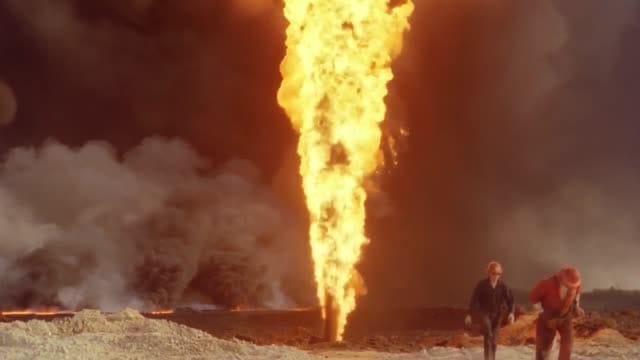One of the most distinctive, unique and iconic (not to mention mimicable) voices in cinema, Werner Herzog’s career has spanned seven decades, with countless classic films under his belt - both fiction and documentary.
His unusual and eclectic career is explored in Thomas von Steinaecker’s new documentary, Werner Herzog: Radical Dreamer, that charts his journey from a pioneer of New German Cinema to Hollywood ubiquity.
To celebrate its release, we take a look at some of the iconic director’s catalogue of films, exploring his ‘ecstatic truth’ theory, and what it means to represent non-fiction stories.

Lessons of Darkness / 1992 / 54 mins
Bertha DocHouse has shown countless Herzog documentaries over the years. In fact, the first film we ever screened back in 2002 was his 1992 film, Lessons of Darkness.
Straddling the line between documentary and science fiction, Lessons of Darkness is an epic visual poem set in the burning oil fields of Kuwait following the 1990-1991 Persian Gulf War.
Herzog has since revealed that the opening lines of the film, attributed to French mathematician and physicist Blaise Pascal – were in fact fabricated by Herzog himself.
During a post-screening discussion in Milan, he explains:
‘Pascal himself could not have said it better… With this quotation as a prefix I elevate the spectator, before he has even seen the first frame, to a high level, from which to enter the film. And I, the author of the film, do not let him descend from this height until it is over. Only in this state of sublimity does something deeper become possible, a kind of truth that is the enemy of the merely factual. Ecstatic truth, I call it.’
You can read the full speech here.
The ‘Ecstatic Truth’
Herzog coined the term ‘ecstatic truth’ in the 1990s. He believes that by transcending mere facts – or what he calls ‘the accountant’s reality’ – the ‘ecstatic truth’ can capture the human experience more faithfully, enabling his viewers to have a deeper emotional and philosophical connection to his films.
How important, really, is the Factual? Of course, we can’t disregard the factual; it has normative power. But it can never give us the kind of illumination, the ecstatic flash, from which Truth emerges.
Werner Herzog
Little Dieter Needs to Fly / 1997 / 80 mins
Little Dieter Needs to Fly recounts the extraordinary life of Dieter Dengler, a German-American pilot who endured the horrors of captivity during the Vietnam War. Blending interviews with Dengler, archival footage, and dramatic reenactments, the films transcends mere facts to delve into the psychological depths of Dengler’s experiences, in pursuit of Herzog’s ‘ecstatic truth’.
In relation to the blurring of fact and fiction, Little Dieter Needs to Fly is particularly noteworthy because Herzog made it in 1997, and then went on to make Rescue Dawn – a fiction film of the same story – in 2006.
Grizzly Man / 2006/ 99 mins
Arguably Herzog’s most well-known documentary, Grizzly Man chronicles the life and death of bear enthusiast Timothy Treadwell, who spent months at a time living with bears in the Alaskan wilderness. His naïve love for the animals blinded him to their danger, ultimately leading to his harrowing death at their hands.
In the context of Herzog’s concept of ‘ecstatic truth,’ Grizzly Man not only the objective facts but also tries to get to the bottom of the deeper emotional and philosophical truths surrounding Treadwell’s life and death.
Herzog’s portrayal of Treadwell doesn’t mock or ridicule his naivety, instead finding the innocence and longing for connection that led him to seek solace with the bears in the first place. However, Herzog ultimately disagrees with Treadwell’s outlook – in one of the most concise summations of his existential worldview – he gives his own conclusion on the grizzly bear: ‘I discover no kinship, no understanding, no mercy. I can see only the overwhelming indifference of nature’.
Discover more about this mysterious and endlessly fascinating director in Werner Herzog: Radical Dreamer.
Book now to watch at Bertha DocHouse